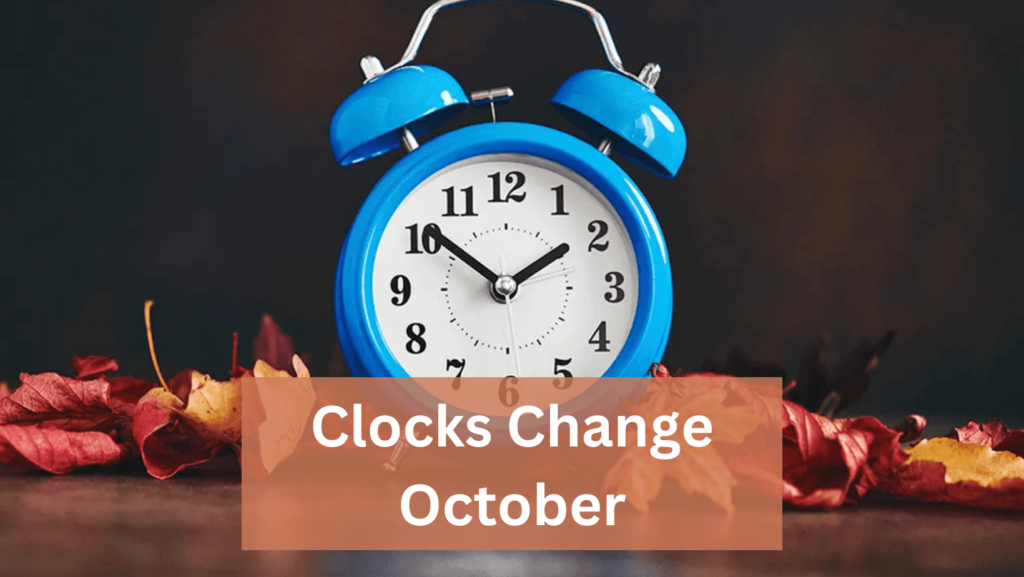Clocks Change October: Everything You Need to Know About the UK’s Winter Time Shift
Each year in October, the UK experiences a significant shift as the clocks change to mark the end of British Summer Time (BST) and the beginning of winter time. This clock change is an essential aspect of the UK’s daylight saving time tradition, giving us an extra hour of sleep but affecting our daily schedules. Here’s everything you need to know about the clocks changing in October, including why, when, and how it impacts daily life.
Why Do the Clocks Change in October?
The clocks change in October as part of the daylight saving time system, which was first introduced in the early 20th century. This time adjustment helps make better use of natural daylight, especially during the shorter winter days. In the UK, the clocks go back in 2024 on the last Sunday of October, marking the end of BST and transitioning the country into Greenwich Mean Time (GMT).
This time shift not only gives us an extra hour of sleep, but it also has practical benefits. For example, more daylight during the working hours can reduce energy consumption. Yet, the change is not without its impacts, especially as it can disrupt people’s routines. For instance, the darker evenings may lead to less outdoor activity and potentially impact our mental health due to reduced exposure to natural light.
Clocks Change October 2024: When Do We Turn the Clocks Back?
Best Pheromone Perfume for Ladies
In 2024, the clocks go back on Sunday, October 27, at 2:00 a.m., signaling the official end of British Summer Time and the start of winter time in the UK. This annual adjustment means we “gain” an hour, which will bring earlier sunsets and longer evenings. For those wondering, the answer to when do the clocks go back UK 2024 is always the last Sunday in October.
This shift is a part of the UK daylight saving time system, which is practiced in several parts of the world. For many, the October clocks changing date serves as a reminder to update all manual clocks and adjust to the time difference, especially for businesses and travelers who rely on precise timing.
How Does the October Clocks Change Impact Daily Life?
The October clocks change in the UK impacts various aspects of life, from work schedules to mental well-being. Here’s how it can affect daily routines:
Health and Sleep Patterns: Although gaining an hour of sleep may sound appealing, the hour change in the UK can disrupt sleep patterns and circadian rhythms. The early darkness can influence mood, potentially leading to seasonal affective disorder (SAD) for some individuals.
Transportation and Schedules: For those commuting or working shifts, the UK time adjustment can complicate schedules. Airlines and public transport systems often adjust their timetables to accommodate the change, and missed appointments or schedule confusion are common.
Energy Use and Business: Businesses see a difference in energy consumption patterns due to the clocks going back in 2024. The change aligns waking hours more closely with daylight, potentially reducing energy costs during office hours but increasing usage in the evenings.
The October UK clocks change has a notable influence on how businesses and households operate through the shorter days of winter. The end of British Summer Time is a great opportunity to re-evaluate your daily routine and prepare for the colder months ahead.
Final Thoughts on the Clocks Change October 2024
As daylight saving time comes to a close, the UK clocks go back 2024 to bring in the winter months. While it can take some time to adjust to the new schedule, this seasonal shift marks an important reminder of our connection to natural daylight patterns. Whether you’re someone who loves the cozy nights of winter or prefers the longer days of summer, the October clocks change in the UK is a long-standing tradition that keeps us in tune with nature’s cycles.
With the clocks changing each October, remember to prepare for this shift and embrace the unique aspects of winter. The end of daylight saving time is a key moment in the UK calendar, reminding us to appreciate the sunlight while it lasts and look forward to the brighter days ahead when British Summer Time returns in spring.



